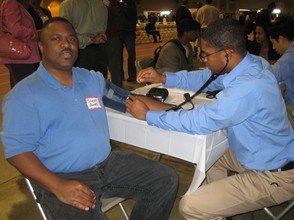(ThyBlackMan.com) Needless to say, it’s extremely important to know the state of health for African-American men. If we were to look at a number of responses to the statement “What is the state of health or how good is it?”, many would unfortunately automatically come up with a negative response.
This is due in part to the contemporary display of African-American men’s lives. They are displayed in the form of adverse stereotypes, fueled by media images and at times coupled with facts that do not necessarily bare the truth. We must work to change the unfavorable images, develop positive attitudes and healthy stats.
Health is based on a number of factors, such as diet, genetics, life style, and the environment. Most of the problems or concerns for the health of  African-American people are clearly not genetic. Therefore the emphasis for improvement should be placed on lifestyle, diet and the environment in which they live.
African-American people are clearly not genetic. Therefore the emphasis for improvement should be placed on lifestyle, diet and the environment in which they live.
Paul W. is a 37-year-old African-American accountant who was a star football player in high school and college with a near perfect physique at that time. Presently he works long hours, doesn’t eat breakfast, drinks at least three soft drinks per day, loves sweets and indulges in ice cream at bedtime. He also smokes a pack of cigarettes per day, doesn’t exercise and drinks occasionally.
Both he and his wife eat their share of fast foods at home and work. In addition, most of the vegetables he eats are on his hamburgers and fruits are rarely ever eaten. Paul lost his near perfect physique some years ago and is extremely overweight (obese) and has not seen a doctor in 10 years. He also lives down the street from an oil refinery.
Paul’s story is extremely disturbing because he’s doing too many of the wrong things; namely, lack of exercise, minimal fruits and vegetables, excessive sweets, smokes and no recent doctor visit. His weight problem (obesity) is due to his diet and lifestyle. Obesity is associated with diabetes, heart disease, HBP, stroke, cancer and premature death.
He also lives near a refinery – most of which produce toxins that are associated with various cancers. If he doesn’t change his habits, his story will not have a happy ending.
Quick Facts:
• In 2005 African-American men were 2.4 times as likely to die from prostate cancer as White men. They also had a lower 5-year cancer survival rate for lung and pancreatic cancer.
• African-American men are twice as likely to develop diabetes as compared to White men. –
• African-American men were 30 percent more likely to die from heart disease as compared to White Men.
• African-American men had more than seven times the AIDS rate and were nine times as likely to die from HIV/AIDS as White men.
• African-American men are 60 percent more likely to die from a stroke than White men.
The U.S. Department of Health & Human Services’ leading causes of death for Black men in the U. S. are: heart disease; diabetes; cancer; HIV Disease; unintentional injuries; chroinic lower respiratory disease; homicide; kidney disease; stroke; and perinatal conditions.
Simply put, there are some African-American men that have great health, there are many with good health and too many with inadequate health. However, all would welcome even more superior health. It’s imperative that those with inadequate or of a lower rank move quickly to lift themselves to better their health. Here are some steps to better health for Black men:
• Be physically-active. Exercise daily and make healthy food choices.
• Eat 5-9 servings of fruits and vegetables daily.
• Get a healthy weight and stay there.
• Be tobacco free.
• If you drink alcohol, have no more than two drinks per day.
• Have your blood pressure checked at least yearly.
• Talk to your doctor about prostate cancer screening, PSA test and digital rectal examination (DRE).
• Talk to your doctor about HIV screening.
• Know what toxins are in your community. There’s a connection with cancer and other diseases from paper mills, refineries and factories.
Written By Dr. Leonard Weather Jr.

















Leave a Reply